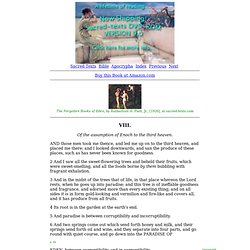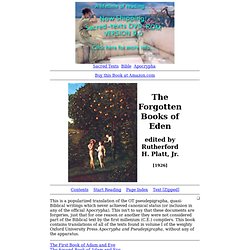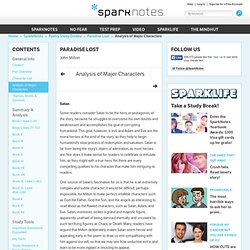

The Forgotten Books of Eden: The Book of the Secrets of Enoch: Chapter VIII. Sacred Texts Bible Apocrypha Index Previous Next Buy this Book at Amazon.com The Forgotten Books of Eden, by Rutherford H.

Platt, Jr., [1926], at sacred-texts.com Of the assumption of Enoch to the third heaven. AND those men took me thence, and led me up on to the third heaven, and placed me there; and I looked downwards, and san the produce of these places, such as has never been known for goodness. 2 And I saw all the sweet-flowering trees and beheld their fruits, which were sweet-smelling, and all the foods borne by them bubbling with fragrant exhalation. 3 And in the midst of the trees that of life, in that place whereon the Lord rests, when he goes up into paradise; and this tree is of ineffable goodness and fragrance, and adorned more than every existing thing; and on all sides it is in form gold-looking and vermilion and fire-like and covers all, and it has produce from all fruits. 4 Its root is in the garden at the earth's end. p. 84 Next: Chapter IX.
The Forgotten Books of Eden Index. Sacred Texts Bible Apocrypha Buy this Book at Amazon.com Contents Start Reading Page Index Text [Zipped] This is a popularized translation of the OT pseudepigrapha, quasi-Biblical writings which never achieved canonical status (or inclusion in any of the official Apocrypha).

This isn't to say that these documents are forgeries, just that for one reason or another they were not considered part of the Biblical text by the first millenium (C.E.) compilers. This book contains translations of all of the texts found in volume I of the weighty Oxford University Press Apocrypha and Pseudepigrapha, without any of the apparatus. Title PageContentsIllustrationsPrefaceIntroduction The First Book of Adam and Eve The Second Book of Adam and Eve Chapter IChapter IIChapter IIIChapter IVChapter VChapter VIChapter VIIChapter VIIIChapter IXChapter XChapter XIChapter XIIChapter XIIIChapter XIVChapter XVChapter XVIChapter XVIIChapter XVIIIChapter XIXChapter XXChapter XXIChapter XXII.
Paradise Lost and Regained Index. Armageddon OT Background to the Battle for the Cosmic Mountain 3 - FallenAngelsTV. First, I would like to offer a quick word about the use of the term myth or mythology.

In popular usage the term has come to mean a story which is necessarily false but that is not the way scholars often use the term. For instance the Pocket Dictionary of Biblical Studies defines myth as, “A story, usually relating the actions of supernatural beings, that serves to explain why the world is as it is and to establish the rationale for the rules by which people live in a given society. In classical Greek, myths were simply stories or plots, whether true or false;” In other words, please do not read into my use of “myth” that I think the events described have no historical basis.
It is my thesis here that the mythologies referenced by the prophets do have a real space time point of reference to actual events whether earthly or cosmic. Saphon/Zaphon is identified with a mountain, Jebel al-ʿAqra, or Casius in classical sources (deriving from the Hittite Chazzi), which lies north of Ugarit. Paradise Lost: Analysis of Major Characters. Satan Some readers consider Satan to be the hero, or protagonist, of the story, because he struggles to overcome his own doubts and weaknesses and accomplishes his goal of corrupting humankind.

This goal, however, is evil, and Adam and Eve are the moral heroes at the end of the story, as they help to begin humankind’s slow process of redemption and salvation. Satan is far from being the story’s object of admiration, as most heroes are. Nor does it make sense for readers to celebrate or emulate him, as they might with a true hero. Yet there are many compelling qualities to his character that make him intriguing to readers. One source of Satan’s fascination for us is that he is an extremely complex and subtle character. Milton devotes much of the poem’s early books to developing Satan’s character. Satan’s character—or our perception of his character—changes significantly from Book I to his final appearance in Book X.
Adam Adam’s greatest weakness is his love for Eve. Eve God.